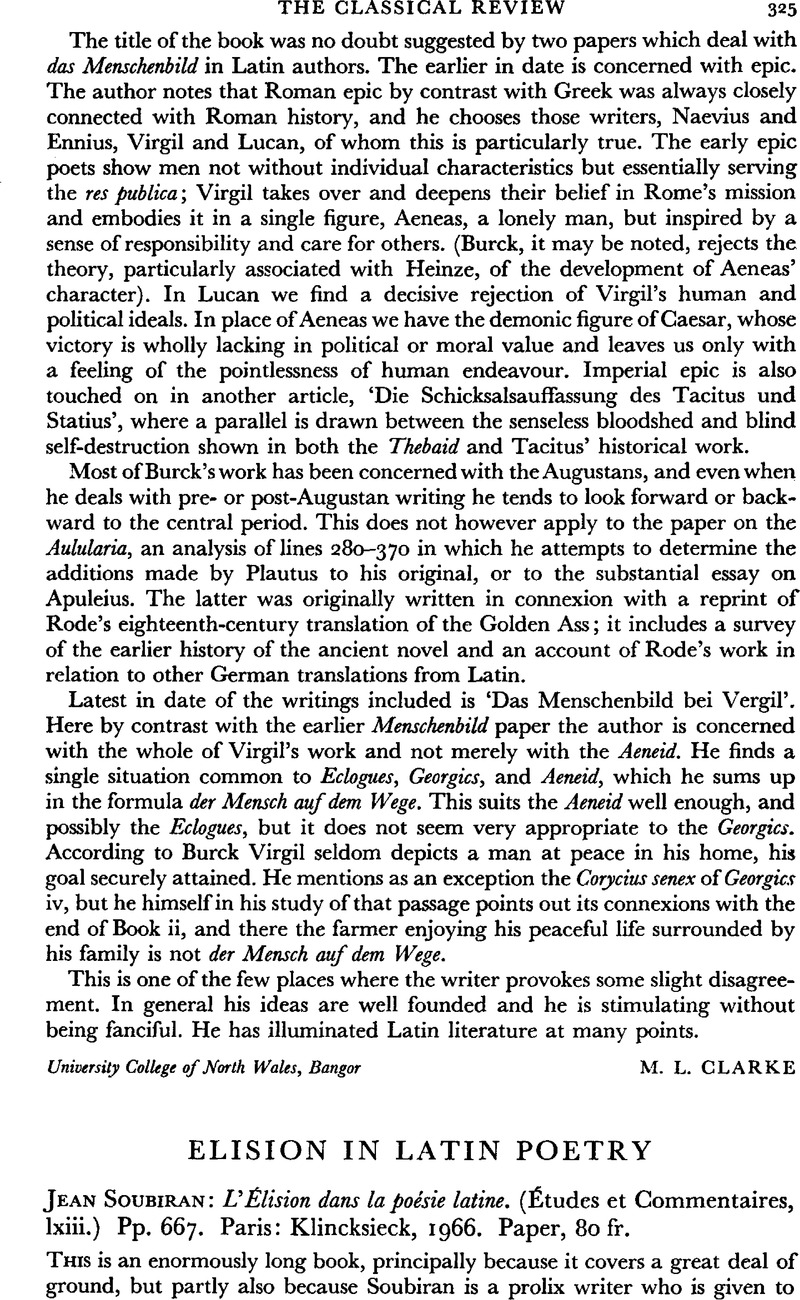Article contents
Elision in Latin Poetry - Jean Soubiran: l'Élision dans la poésie latine. (Études et Commentaires, lxiii.) Pp.667. Paris: Klincksieck, 1966. Paper, 80 fr.
Published online by Cambridge University Press: 27 February 2009
Abstract

- Type
- Reviews
- Information
- Copyright
- Copyright © The Classical Association 1967
References
page 326 note 1 It so happens that this very discussion of elision before h- seems to me to contain a fallacy. Soubiran argues that Virgil and Seneca are reluctant to elide a long vowel before the forms of hic and concludes that in these cases the h was strongly pronounced. His thesis credits both poets with an ear of to me inconceivable delicacy: for since both of them do in fact elide long vowels before hic, one is bound to ask why they felt it appropriate to do so in these cases but not in others, a question to which no answer is offered. But Soubiran's figures for Seneca (pp. 108–9) seem insufficiently marked to prove anything; and the discussion of Virgil's practice overlooks certain structural considerations. It has been shown by J. Hellegouarc'h, Le Monosyllabe dans l'hexamètre latin (1964), pp. 141–50, that Virgil particularly favoured monosyllables at the 3rd longum, especially though not exclusively articulatory monosyllables. Soubiran himself has pointed out that Virgil favours the elision of long vowels and syllables in -m before monosyllables in this position; but, as he also remarks (pp. 181–2, 528), these are cases of aphaeresis rather than elision proper. Before hic and its parts (as opposed to et, aut, atque et sim.) elision rather than aphaeresis would operate: thus the rarity of cases like erramus uento huc (Aen. i. 333) is due rather to the dislike of almost completely losing the metrically important (Soubiran, p. 527) vowel -ò than to a ‘strong’ pronunciain tion of h.
page 326 note 2 Soubiran's third exception, the case of so-called ‘hiatus prosodique’, is obviously controversial and best left to the experts.
page 326 note 3 The case of es is doubtful. Apropos of A.L. 462. 28 impius hoc telo es; hoc poles esse pius, Soubiran correctly notes that there are occasional instances of short syllables lengthened before the caesura of the pentameter, but his three examples from Ovid (p. 177, n. 1) are all false.
page 327 note 1 More scientifically defined by Soubiran as ‘élisions de longues et de finales en -m entre les deux breves brèves d'un dactyle.’
page 327 note 2 Her. 8. 71 Castori Amydaeo et Amyclaeo Polluci, accepted by Soubiran (p. 215) as ‘un hellénisme prosodique’, must be disallowed.
page 328 note 1 The point is made with extreme economy by the examples deployed by Winbolt, S. E., Latin Hexameter Verse (1903), pp. 179–180Google Scholar. When so much antiquated rubbish is being reprinted at famine prices, it is sad that this unpretending and informative little book is a collector's item.
- 1
- Cited by




